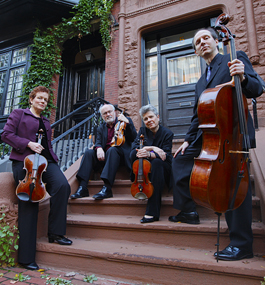Late, Great Music for the Ages

Photo by Mike Lovett
Lydian String Quartet
Most Excellent Fellows,
With this note each of you receives his part, and each is pledged and bound upon his word of honor to do his best, to distinguish himself and to vie in excellence with his companions. Each who is to take part in the said matter must sign this paper.
You can’t sense the transcendence — yet. But you can feel the pressure.
In February 1825, Ludwig van Beethoven wrote this terse, legalistic letter to the musicians who were about to premiere his Quartet in E Flat, Op. 127, the first of his five “late quartets.” Time was running short; the first performance was less than two weeks away.
And Op. 127 was not easy to play. The handwritten parts that accompanied the composer’s note “presented new challenges of stamina and intensity” in addition to “great beauties,” says Daniel Stepner, Brandeis professor of music and first violinist in the world-renowned Lydian String Quartet.
In July, the Lydians marked the release by Centaur Records of a new three-CD box set of their recordings of all five of Beethoven’s late quartets — widely considered to be his end-of-life masterpieces.
As Stepner writes in his liner notes for the CD set, “Whatever the psychological truth of Beethoven’s intent, it can hardly be denied that in his last three years he still had — despite his isolation in deafness, his disastrous attempts at raising his unstable nephew, his constant changing of living quarters and his debilitating illnesses — a burning need to communicate an exalted, complex, life-affirming vision of musical possibility.”
The five quartets require both virtuosic skill and emotional clarity from musicians. “The late quartets range from lyrical and profound to uproarious and even violent,” Stepner says. “Through them, Beethoven expanded the palette of composers and players alike.”
Since their formation in 1980, the Lydians have never shied away from tackling the most demanding examples of quartet composition in their performances and recordings, including works by Franz Schubert, Johannes Brahms, and John Harbison, as well as such Brandeis composers as Irving Fine, Harold Shapero, Yehudi Wyner, Yu-Hui Chang, Eric Chasalow and David Rakowski.
This fearlessness is apparent in the new box set. “Beethoven’s late quartets expand the expressive possibilities of both string playing and music making in general,” says Stepner. “Their challenge to both listener and player is well worth taking up.”
Like Stepner, the other Lydian String Quartet players are members of the Brandeis music faculty: Judith Eissenberg (second violinist), Joshua Gordon (cellist) and Mary Ruth Ray (violist).
For more information about “The Late Quartets” box set, go to the The Lydian String Quartet Website.
— Susan Piland
